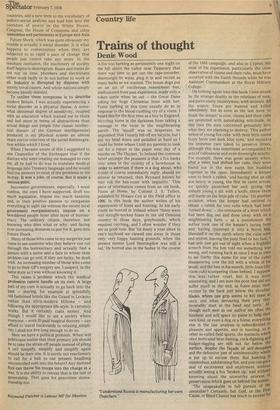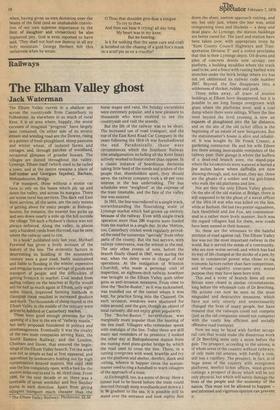Country life
Trains of thought
DeniE Wood
A fox was barking so persistently one night on the hill above the valley near Tipperary that there ;as time to get out the tape-recorder, disentangle its wires, plug it in and record as many barks as we wanted. The house dogs put on an act of vociferous resentment but, disillusioned from past experience, made only a token sortie when let out — the Great Dane taking her huge Christmas bone with her. Foxes barking at this time usually do so in response to the blood-curdling cry of a vixen. I heard this for the first time as a boy in England, bicycling home in the darkness from taking a message to the vicar in the neighbouring parish. The 'squall' was so desperate, so anguished, that I nearly fell off my bicycle, but I put my head down and pedalled as hard as I could for home where I told my parents to look out for a report in the paper next day of a murder on The Thicket. 'In Ireland the common belief amongst the peasants is that a fox barks 'only when in the vicinity of a farmhouse in order to ascertain if there is a dog about, who would of course immediately reply; should no answer be returned, then Reynard knows he may rob the hen-roost with impunity.' This piece of information comes from an old book, Foxes at Home, by Colonel J. S. Talbot, published by Horace Cox at the Field office in 1906. In this book the author writes of his experiences of foxes and hunting. In his early youth he hunted in Ireland where 'there were real straight-necked foxes in the old Ormond country in those days, greyhounds, which required catching, and I often wonder if they are as good now. But 'tis many a year since in one's boyhood we viewed one away in those very, very happy hunting grounds, when the present master Lord Huntingdon was still a lad.' He hunted also in the Sudan in the course
of the 1885 campaign, and also in Cyprus; but most of his experience, particularly the close observation of vixens and their cubs, must have occurred with the Garth Hounds while he was Assistant Commandant at the Royal Military College.
On looking again into this book I was struck by the strange duality in the relations of men, and particularly countrymen, with animals. All the winter, foxes are hunted and killed relentlessly, but as soon as the last meet 'to finish the season is over, vixens and their cubs are protected with painstaking solicitude. At this time the men concerned genuinely love what they are planning to destroy. This author writes of young fox cubs 'with their little round fuzzy faces and dark blue eyes,' and recounts the immense care taken to preserve litters, although this was sometimes accompanied by acts of callousness and even downright cruelty. For example, there was great anxiety when, after a vixen had shifted her cubs, they were found not in the new earth but huddled together in the open. Immediately a keeper went to fetch a rabbit, 'and having shot an old doe heavy in young, the first he came across, we quickly paunched her and, giving the unborn young a slit with a knife, threw them still warm on the little pile of cubs.' On another occasion, when the keeper had omitted to obtain a rabbit for two cubs which had been 'turned down' — the remnants of a litter which had been dug out and done away with on a neighbouring farm — as a punishment the author took one of the keeper's laying hens and, having crammed it into a ferret bag, liberated it on the earth where the cubs were and retired, leaving the poor fowl to her fate. 'I had only just got out of sight when a frightful screech from the hen told me something was wrong, and running back at once I was in time to see Darby (his name for one of the cubs) disappearing over the hill with a whisk of his brush, and the hen in his mouth, little Joan (the 'vixen cub) scampering close behind. I suppose this was rather cruel, but it was most interesting, and I aril sure the poor hen did not suffer much in the end, as foxes seize their victims by the back just below the shoulder blades, where one grip seems to kill them at once, and when devouring their prey they invariably start at the head and neck:, Although such men as our author are often the kindliest and will spare no pains to help their own kind, or even a dog or a horse, everything else in the last analysis is subordinated to pleasure and appetite, and in hunting, as in other so-called field sports, the instincts which once motivated bear-baiting, cock-fighting and badger-digging are still not far below the surface, despite the facade of self-deception and the defensive jeer of sentimentality which is put up to excuse them. But hunting IS tremendous, exhilarating fun, and you can get a deal of excitement and enjoyment without actually seeing a fox 'broken up,' and without knowing about the unworthy process uf preservation which goes on behind the scenes.
'The unspeakable in full pursuit of the uneatable'? Certainly, but God, or the First Cause, or Blind Chance has much to answer for
when, having given us men dominion over the beasts of the field (and an unshakabIe conviction of our own supreme importance to the limit of slaughter and vivisection) he also implanted pity. God is even reported to have said, They shall not hurt nor destroy in all my holy mountain.' George Herbert felt this unfairness when he wrote: 0 Thou that shouldst give dust a tongue To cry to thee, And then not hear it crying! all day long My heart was in my knee, But no hearing.
Is it for nothing that the same care and craft is lavished on the chasing of a gold fox's mask on a scarf pin as on a crucifix?



























 Previous page
Previous page